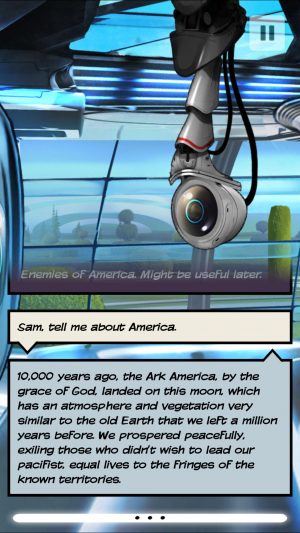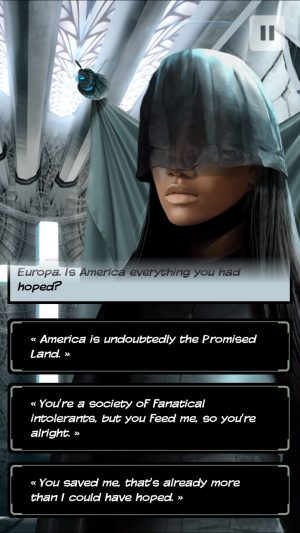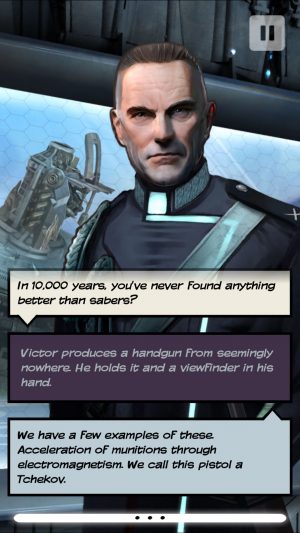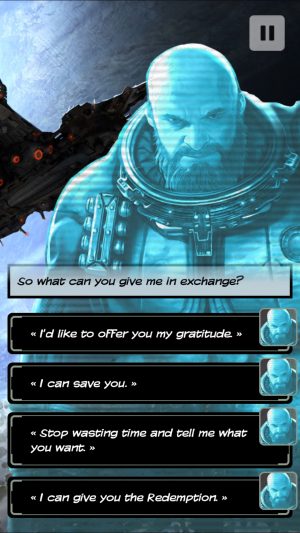 Out There Chronicles ($1.99) is a good idea. Take the mysterious, interesting universe of the survival/resource management game Out There ($4.99) and create a gamebook in the same setting that helps flesh the background out. A boots on the ground view, so to speak. It’s even written by the same person that wrote the original game. The presentation is quite strong for a game of this genre, adopting much of the aesthetic of the core Out There experience, and it even attempts to incorporate a few of the mechanics, such as learning alien languages and trying to conserve resources. As a companion piece to Out There, it’s pretty neat. But while it’s good at evoking the feel of its parent, as a piece of interactive fiction, it leaves me a bit cold.
Out There Chronicles ($1.99) is a good idea. Take the mysterious, interesting universe of the survival/resource management game Out There ($4.99) and create a gamebook in the same setting that helps flesh the background out. A boots on the ground view, so to speak. It’s even written by the same person that wrote the original game. The presentation is quite strong for a game of this genre, adopting much of the aesthetic of the core Out There experience, and it even attempts to incorporate a few of the mechanics, such as learning alien languages and trying to conserve resources. As a companion piece to Out There, it’s pretty neat. But while it’s good at evoking the feel of its parent, as a piece of interactive fiction, it leaves me a bit cold.
You play as Darius, a survivor of the Ark Europa who has been recovered by descendants of the people of Ark America. You’ve been in cryostasis for an incredibly long time, which makes a nice excuse for why other characters might need to lay the exposition on a bit thick. While the people of America found you, the rest of your people were nowhere to be found. Locating them is your first priority, but there’s another wrinkle in this tale. While the people of America have forgotten much of their history, your character remembers the sordid details of a raging war like they were yesterday. Without spoiling too much, Darius has a pretty hard time fitting in with the peaceful utopia of the new planet America.
 Out There Chronicles is billed as the first episode of a longer story, and true to its word, it ends without resolving the main plot. Nevertheless, it does have a fairly satisfying arc of its own, and unlike many first chapters, the climax is suitably high-stakes. It’s quite a bit longer than it seems to be at first blush, as well. You might expect the whole game to take place on America, but it wouldn’t be much of an Out There game if you didn’t end up, well, out there, would it? You’ll meet quite a few characters along the way, and a few of them are given some reasonable development. Even a lot of the minor characters appear to have had a lot of work put into them, though I suppose that’s because there’s a chance they’ll reoccur in later episodes.
Out There Chronicles is billed as the first episode of a longer story, and true to its word, it ends without resolving the main plot. Nevertheless, it does have a fairly satisfying arc of its own, and unlike many first chapters, the climax is suitably high-stakes. It’s quite a bit longer than it seems to be at first blush, as well. You might expect the whole game to take place on America, but it wouldn’t be much of an Out There game if you didn’t end up, well, out there, would it? You’ll meet quite a few characters along the way, and a few of them are given some reasonable development. Even a lot of the minor characters appear to have had a lot of work put into them, though I suppose that’s because there’s a chance they’ll reoccur in later episodes.
I continue to appreciate the way Out There handles aliens in its universe. While it’s expedient for live action entertainment to make aliens resemble humans with minimal or no alterations, there’s no reason why games should have to stick to that custom. The only things that look and act like humans in Out There Chronicles are the humans themselves. The other aliens you meet cover a wide variety of appearances and mannerisms. You won’t be able to communicate with most of them until you learn some of the local language, and even then, you’re going to have to do some interpretation. The alien language ended up being one of my favorite things about this game. When an alien uses a word you don’t understand, you can ask for clarification. The alien will try to explain with body language or gestures, and then it’s up to you to choose which word you think they mean from a short list. Whatever you pick will be substituted in for that word from there forward.
 That’s just a small part of a much larger game, however. Most of the time, you’ll be doing the usual gamebook business of reading some text and choosing an action from a list. Where Out There Chronicles differs from the usual genre fare is that making a choice rarely locks you out of the other selections. There are some situations where you can only make one choice, and certainly plenty of branches where you’ll get a game over if you make particular selections, naturally. In general, however, the choices in this game feel more like navigating the dialogue tree of an RPG. You can ask as many questions as you like, pursue follow-up questions, and then return to the previous set to ask whatever else you want. This often makes it feel like you’re just hitting every button on the dash looking for the one that will let you proceed.
That’s just a small part of a much larger game, however. Most of the time, you’ll be doing the usual gamebook business of reading some text and choosing an action from a list. Where Out There Chronicles differs from the usual genre fare is that making a choice rarely locks you out of the other selections. There are some situations where you can only make one choice, and certainly plenty of branches where you’ll get a game over if you make particular selections, naturally. In general, however, the choices in this game feel more like navigating the dialogue tree of an RPG. You can ask as many questions as you like, pursue follow-up questions, and then return to the previous set to ask whatever else you want. This often makes it feel like you’re just hitting every button on the dash looking for the one that will let you proceed.
While the overall plot and character work is interesting enough, Out There Chronicles fumbles with the nuts and bolts of its dialogue. Just on a technical level alone, there are a lot of typos and grammar errors compared to other efforts in the genre. The writing struggles to give each character their own voice, and while I don’t doubt some fans will appreciate it, the game has a tendency to drone on a little too long about the minutiae of the universe. I’m not sure what it says that I enjoyed the simple translated dialogue with the aliens more than anything any of the humans had to say. The text isn’t as enjoyable to read as it needs to be, and it drags down an otherwise well-written plot.
 The old gamebook bugbear of there being only one true path rears its head in an ugly fashion here, as well. In the early stages, it feels like you have options in front of you, and the game does a good job of guiding you where it wants you to go without doing so explicitly. As the story goes on, that illusion quickly fades, making it all too apparent that in most situations there is only one correct choice, provided your choice even matters at all. There are plenty of situations where different choices lead to the same outcome, and while it’s possible the game is keeping track of those decisions for a later pay-off, it’s certainly not reflected in this episode in any meaningful way. At most, all I could spot where a few situations that became no-win scenarios if you hadn’t taken a specific choice a few minutes earlier, which feels less like consequences for decisions and more like missing a critical item in a Sierra adventure game.
The old gamebook bugbear of there being only one true path rears its head in an ugly fashion here, as well. In the early stages, it feels like you have options in front of you, and the game does a good job of guiding you where it wants you to go without doing so explicitly. As the story goes on, that illusion quickly fades, making it all too apparent that in most situations there is only one correct choice, provided your choice even matters at all. There are plenty of situations where different choices lead to the same outcome, and while it’s possible the game is keeping track of those decisions for a later pay-off, it’s certainly not reflected in this episode in any meaningful way. At most, all I could spot where a few situations that became no-win scenarios if you hadn’t taken a specific choice a few minutes earlier, which feels less like consequences for decisions and more like missing a critical item in a Sierra adventure game.
Out There Chronicles isn’t as cruel about that as those older games, at least. It saves as certain intervals and if you happen to get a game over, you’ll always be set back to a point where you can actually make a difference. This makes it easier to brute force the game, which will be a positive thing for some and a negative for others. There are a couple of situations where the correct answer is hard to suss out from the text, so I appreciated being able to just push my way through without worry occasionally. At the same time, it also made my decisions feel even less important than they already did. Knowing there is really only one route through the game and that you’re never at risk of losing any major progress essentially drains the tension and enjoyment from making decisions.
 The main reason to replay the game comes from its rather large selection of Game Center achievements. Some of them are missable if you don’t make certain choices, and it’s impossible to get them all in a single playthrough. Whether it’s worth playing through a rather lengthy gamebook multiple times just to snag a few achievements is an exercise best left to the reader, but it’s at least something. I think fans of Out There might enjoy uncovering all of the lore, particularly since this is set in an earlier period where much of the foundations of the universe are being established. If nothing else, Out There Chronicles looks and sounds better than a lot of interactive fiction games.
The main reason to replay the game comes from its rather large selection of Game Center achievements. Some of them are missable if you don’t make certain choices, and it’s impossible to get them all in a single playthrough. Whether it’s worth playing through a rather lengthy gamebook multiple times just to snag a few achievements is an exercise best left to the reader, but it’s at least something. I think fans of Out There might enjoy uncovering all of the lore, particularly since this is set in an earlier period where much of the foundations of the universe are being established. If nothing else, Out There Chronicles looks and sounds better than a lot of interactive fiction games.
Is that enough? Well, I suppose it has to be. I don’t honestly think Out There Chronicles is going to please many from the usual gamebook crowd in its current form. The choices lack weight, and the game is a little too obvious about the rails you’re traveling on. Structurally, it plays out more like a rudimentary adventure game, asking you to exhaust all dialogue options to try to find the key to the next lock. The main plot is interesting and the characters seem to have had a lot of effort put into them, but the English text could really use a few more editing passes. Ultimately, I think it’s best taken as an extension of the original game, but I think I’d rather just play that instead.
